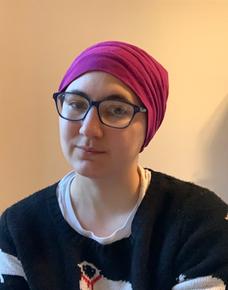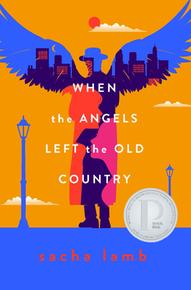 Earlier this year, Sacha Lamb won both the Stonewall Award and the Sydney Taylor YA Book Award for outstanding books that authentically portray the Jewish experience, and also received a Printz Honor for their debut, When the Angels Left the Old Country (Levine Querido).
Earlier this year, Sacha Lamb won both the Stonewall Award and the Sydney Taylor YA Book Award for outstanding books that authentically portray the Jewish experience, and also received a Printz Honor for their debut, When the Angels Left the Old Country (Levine Querido).
It can be quite intimidating to win an award like these for a debut, but I imagine it could also feel invigorating and affirming--how do you feel?
I certainly feel like I've given myself a tough act to follow, but on the other hand, it's very validating to have this kind of recognition for a book that I wrote straight from my heart. I really wrote this story for fun and put everything I love the most into it, and clearly that's come through for the readers, so I guess I just have to keep hold of that sincere feeling!
Would you give our readers your two-sentence pitch for When the Angels Left the Old Country?
It's an Ellis Island-era immigrant fairytale starring an angel and a demon who are Talmud study partners and leave their shtetl to rescue a girl who's gotten into trouble on her way to America. On the way, they discover that the "Golden Country" is a complicated place full of magic and mystery and murders.
 This novel has been compared with Good Omens and Elatsoe, two fabulous and very funny books--how do those comparisons feel to you?
This novel has been compared with Good Omens and Elatsoe, two fabulous and very funny books--how do those comparisons feel to you?
I love both of these books! When I first got the offer from Levine Querido, I was telling everyone, "I'm going to be on a list with Darcie Little Badger!" I love how she handles folklore with both Native and European supernatural elements. Good Omens obviously has the angel/demon odd couple thing going on, but it's set in a Christian mythological universe, so in that way it's very different. Both comps give an angle on Angels that hopefully intrigues people enough to check it out and find out what makes it unique!
What was your inspiration for this book? For how long did Uriel and Little Ash live in your brain before you began to tell their story?
The first draft was actually incredibly quick from inspiration to completion. I think it took me two months. I had the idea of an angel/demon queer chavrusa pairing, I started writing thinking it was going to be a short story, and next thing I knew it was a draft of a novel. The path has been very smooth for this book, in a way that is very, very unusual, it's been kind of a whirlwind. I credit the incredible narrative energy that's contained in the bickering angel and demon partnership!
Did you have to do any research while writing this book?
I kind of got the research "for free" because I had just finished my master's thesis in history when I started writing it. That was focused on Jewish immigration in the 1920s, so I read up on the whole period from 1880-1930. The folklore aspects I had been researching for a few years starting from a different YA project. I did have to brush up on some of the specifics of the Ellis Island encounter for the book, but in a way, I got to cheat by having done all the research before I started writing.
What was the editorial process like?
It was a lot of fun; I was working with really great editors. Obviously, everyone knows Arthur Levine, but Maddie McZeal, who was the assistant editor on this, was also so great. They really helped push me in the directions that the story needed to go to be the strongest version of itself. There's always some struggle involved in taking things apart and putting them back together, but it's worth it.
After the awards announcements, you tweeted, it's "very touching to see this extremely Jewish book recognized for its queerness, and extremely queer book for its Jewishness." I love this sentiment. Could you speak more to it?
The queer and Jewish elements of the book are intertwined quite closely, and that was a deliberate effort that I made, to make sure that Judaism and queerness weren't in opposition to each other within the story. The goal with that is to help readers who have felt conflict between those sides of their identities--queer people who've felt rejected by elements of Judaism, Jewish people who've faced antisemitism in the queer community--to find a place where their whole self belongs. This isn't the only queer Jewish YA by any means; the last couple of years have been very exciting in that regard with books like The City Beautiful and From Dust, a Flame even bringing in the fantasy element. But it's a message that bears repeating. You don't have to give up any part of yourself if you don't want to. There is a place for you, and it is even possible to imagine that others like you existed in the past. That's one of the things I hope people take away from this story.

